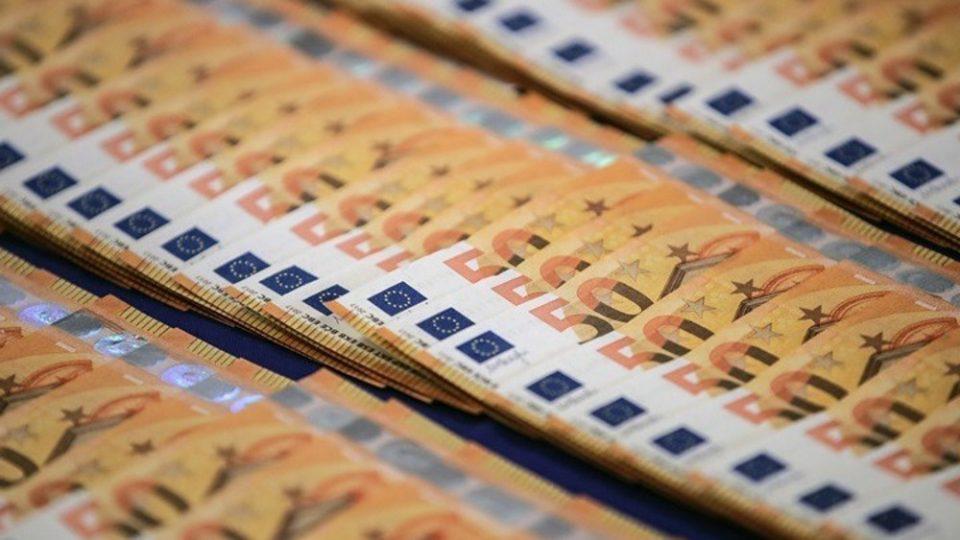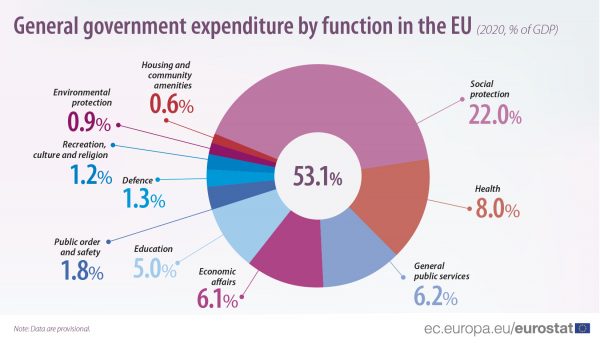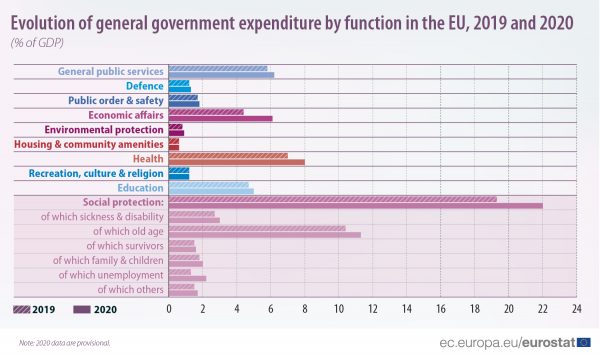
In 2020, general government total expenditure in the EU amounted to 53.1% of gross domestic product (GDP). Due to the COVID-19 pandemic and government measures to mitigate its effects, this ratio increased strongly from the previous year (46.5%) as a consequence of decreases in GDP, as well as increases in total expenditure (€7 118 in 2020 compared with €6 521 billion in 2019; an increase of €598 billion, equal to 9.2% compared with 2019).
This information comes from recently published data on general government expenditure. The article presents only a handful of findings from the more detailed set of Statistics Explained articles. 
Highest proportion of government expenditure goes to social protection and health
Among the main functions of general government expenditure in the EU, ‘social protection’ remained by far the most important in 2020, equivalent to 22.0% of GDP. The next most important areas were ‘health’ (8.0%), ‘general public services’ (6.2%) such as external affairs and public debt transactions, ‘economic affairs’ (6.1%) and ‘education’ (5.0%). The functions ‘public order and safety’ (1.8%), ‘defence’ (1.3%), ‘recreation, culture and religion’ (1.2%), ‘environmental protection’ (0.9%) and ‘housing and community amenities’ (0.6%) had more limited weights.
Strong increases in social protection, economic affairs and health driven by the COVID-19 pandemic
At EU level, general government total expenditure increased for all the major functions, but increases were concentrated in ‘social protection’ (+€238 billion, of which +€118 billion were for ‘unemployment’), ‘economic affairs’ (+€206 billion) and ‘health’ (+€95 billion).
Ratio of social protection expenditure highest in France and Finland, lowest in Ireland
‘Social protection’ represented the most important area of general government expenditure in 2020 in all EU Member States. Government social protection expenditure as percentage of GDP varied across EU Member States from 10.2% in Ireland, 12.0% in Malta and 13.1% in Bulgaria, to over a quarter in France (27.3%), Finland (25.7%) and Italy (25.2%). 
Government expenditure on health highest in Czechia and Austria, on education highest in Sweden, on economic affairs highest in Croatia
In 2020, Czechia and Austria (both 9.2%) and France (9.0%) recorded the highest ratios of government expenditure to GDP devoted to health among EU Member States.
The highest ratios of government expenditure to GDP on general public services were observed in Italy (8.7%), Greece and Finland (both 8.4%).
The highest share of government expenditure on economic affairs in 2020 was recorded in Croatia (11.3%), ahead of Malta (10.0%).
For education, the highest shares were registered in Sweden (7.2%).
Expenditures in Greece
Greece spends slightly more than the European average for social protection, 22.5%. Economic affairs is the next category of expenditures with a rate of 9.9% i, ie 3.8 points above the EU average, followed by public services at 8.4%.
For health, the state spends 6.7% of its outlays, well below the European average, and for education 4.5%. The share of defense in public spending is twice the EU average at 2.6%, followed by civil protection with 2.4% (compared to 1.8% on average in the EU), environmental protection, almost twice as much as the European average, at 1.6% and local infrastructure at just 0.3% of the total.
Latest News

New Exposé by Domumento Reveals Nefarious Triangular Link of ‘Black Money’ with New Democracy, Blue Skies, & Truth Team
The latest exposé by the Documentonews.gr news site lays bare what appears to be a surreptitious path of indirect financing of ND through the business sector—transactions that, as widely understood, rarely occur without expectations of reciprocal benefit

PM Meloni Meets Vice President Vance in Rome Signalling Optimism on Ukraine Talks
Meloni emphasized the strength and strategic value of the Italy-U.S. partnership.

Airbnb: Greece’s Short-Term Rentals Dip in March Amid Easter Shift
Data from analytics firm AirDNA shows that average occupancy for short-term rentals dropped to 45% in March, down from 49% the same month last year.

Easter Week in Greece: Holy Friday in Orthodoxy Today
At the Vespers service on Friday evening the image of Christ is removed from the Cross and wrapped in a white cloth

Meloni and Trump Meet in Washington, Vow to Strengthen Western Ties
“I am 100% sure there will be no problems reaching a deal on tariffs with the EU—none whatsoever,” Trump stressed.

ECB Cuts Interest Rates by 25 Basis Points in Expected Move
The ECB’s Governing Council opted to lower the deposit facility rate—the benchmark for signaling monetary policy direction—citing an updated assessment of inflation prospects, the dynamics of underlying inflation, and the strength of monetary policy transmission.

Current Account Deficit Fell by €573.2ml Feb. 2025: BoG
The improvement of Greece’s current account was mainly attributed to a more robust balance of goods and, to a lesser extent, an improved primary income account

Hellenic Food Authority Issues Food Safety Tips for Easter
Food safety tips on how to make sure your lamb has been properly inspected and your eggs stay fresh.

Greek Kiwifruit Exports Smash 200,000-Ton Mark, Setting New Record
According to data by the Association of Greek Fruit, Vegetable and Juice Exporters, Incofruit Hellas, between September 1, 2024, and April 17, 2025, kiwifruit exports increased by 14.2%.

Easter Tourism Boom: Greece Sees 18.3% Surge in Hotel Bookings
Among foreign markets, Israel has emerged as the biggest growth driver, with hotel bookings more than doubling—up 178.5% year-on-year.







![Πλημμύρες: Σημειώθηκαν σε επίπεδα ρεκόρ στην Ευρώπη το 2024 [γράφημα]](https://www.ot.gr/wp-content/uploads/2025/04/FLOOD_HUNGRY-90x90.jpg)





![Airbnb: Πτωτικά κινήθηκε η ζήτηση τον Μάρτιο – Τι δείχνουν τα στοιχεία [γράφημα]](https://www.ot.gr/wp-content/uploads/2024/07/airbnb-gba8e58468_1280-1-90x90.jpg)


























 Αριθμός Πιστοποίησης
Αριθμός Πιστοποίησης